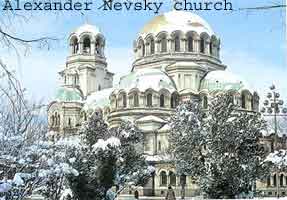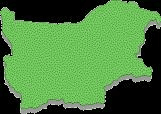|
|
Sofia (1.1 mln) is the capital of the Republic of Bulgaria. Together with the satellite communities it has a
status of a sovereign administrative region. The area of the region is 1354 sq.km (1.2% of the territory of the country) and the population is 1,111,476 which is 14% of the population of Bulgaria. The capital is an administrative
center of two separate administrative regions - Sofia (the city) and Sofia (the region).
Sofia was proclaimed the capital of Bulgaria on April 3, 1879. It is picturesquely situated at the foothills of the high mountain Vitosha (2291 m over sea level) in a vast valley. The city is an important crossroads in the Balkans. The international motorway to Belgrade and Istanbul and the shortest route from Northern Europe to the Aegean Seaside pass via Sofia. The development of Sofia was strongly influenced by the hot springs and the fertile soils. The 5 thousand years history of the city can be traced in the different occupational layers, where monuments of Thracians, Romans, Slavs and Bulgarians have survived.
The functions of the capital influence the development of the city economy. There are big industrial enterprises for ferrous metals (Kremikovtsy Ltd), for non-ferrous metals at Gara Iskar suburb, for machine tools (ZMM-Sofia Ltd), for electrical engineering and electronics (Gara Sofia Sever and Electronika), chemical enterprises (Pharmaceutical plant, Aroma for perfumery and cosmetics, enterprises for rubber commodities). Of significant importance are the enterprises for consumer goods - food products (big enterprises for meat products, for milk and dairy products Danon-Serdika, for flour, for chocolate), for textile (cotton, wool and knitted fabrics), for fur commodities (Gara Iskar), for footwear etc. Agriculture is specialized in livestock breeding - cows, pigs and poultry. There are livestock farms around the city supplying it with milk and meat.

The museum Earth and Man unique exhibits. Very famous cultural monuments are the Church of Boyana, the Alexander Nevsky memorial church with its rich collection of icons in the crypt, the National Palace of Culture. High quality of services for foreign guests are offered at hotels Vitosha, Sheraton, Novotel and Rodina.
A specializing industry for Sofia is tourism: mountain tourism (Vitosha), health tourism
(Banya, Gorna Banya, Pancharevo) and cultural tourism - visits to many cultural
and historic monuments. The capital is a national motorway and railway junction.
The national palace of culture is
the true center of the cultural activities in the capital
Sofia is the political, financial and cultural center of Bulgaria with the Parlament (National Assembly), the Presidency, the Council of Ministers, the Constitutional Court and the Supreme Court, the missions of different international organizations, the headquarters of the biggest political parties in the country. Sofia is the home of the biggest scientific institutions: Bulgarian Academy of
Sciences, Sofia University St. Kliment Ohridsky, the National Academy of Art, the National Sports
Academy, the Bulgarian Conservatoire, the University of National and World Economy etc. Very popular are the museums of history, of archeology, of ethnography, of natural history.
|

